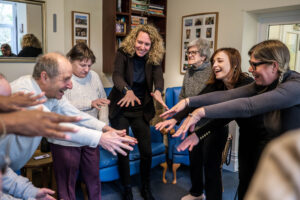
LMN Musicians Westcombe Brass and LMN Director Nina Swann hand delivered their consultation responses to the Department for Education.
Music education is under serious threat. The coalition government is in the process of expressly advising local authorities to completely stop funding music education services. The effects of this cannot be under-stated. Most schools would simply no longer be able to provide music provision, except in the limited number of cases where parents pay for it themselves. It would become the preserve of the wealthy, rather than the right of every child – as envisaged in the National Music Plan. Live Music Now strongly opposes this move, and fully supports the Protect Music Education campaign.
LMN musicians provide music sessions for special schools all around the UK, providing children with experiences that can have a profound impact on their well-being and ability to communicate. We can only do so where local authorities and charitable donors make it possible. The system is already straining at the seams, and if local authorities remove their funding, the impact on children (including those with special educational needs) and musicians would be significantly damaging.
LMN responded to the Government's proposal and asked that they withdraw the recommendation and commit fully to supporting music education. We also encouraged our musicians and supporters to do the same.
For more information on how to support the Protect Music Education campaign, visit www.protectmusiceducation.org
Live Music Now's Strategic Director for Special Educational Needs, Karen Irwin, responds below:
Dear Ms Barbour
I am responding to the Department for Education's (DfE) consultation titledSavings to the Education Services Grant 2015-16 recommending that local authorities stop funding music services. I am the Strategic Director for Special Educational Needs at Live Music Now – a national music charity delivering music sessions to those with least access to high quality music provision. (www.livemusicnow.org)
The consultation includes the expectation that local authorities stop funding music services. I am asking for the Department for Education (DfE) to withdraw this expectation and instead recommend that local authorities continue to fund their music services. My answers address questions 4 a, b and c.
Consultation Question 4a Are there any reasons why local authority expenditure on central support services could not be significantly reduced, if not stopped altogether? Please give details below.
|
|
Yes. The National Plan for Music Education sets out a vision for music education in England which depends on the combination of financial support of the Department for Education, schools and parents, and local authorities. In the foreword to the National Plan for Music Education, this complex funding structure was recognised as was the interdependence between the different elements of the music education sector. The Department for Education is committed to access, saying 'it is important that music education of high quality is available to as many [children] as possible: it must not become the preserve of those children whose families can afford to pay for music tuition. While music touches the lives of all young people, the disadvantaged can benefit most.' The economic value of music education was also recognised when the National Plan stated that 'we would not have scaled the heights of artistic greatness in the first place without our pre-eminence in music education.' The key to ensuring the quality and sustainability of musical opportunities for children is to ensure the continuation of national, local, school and parental funding for music education hubs. This funding is critical in opening up opportunities for significant numbers of children to access music education. 1. Funding National funding for music education hubs is reducing from a high of £82.5 million in 2010-11 to just £58 million in 2014-15. If local authority funding is also lost, access to musical tuition and a good music education will become the preserve of a few. Further, the successful delivery of the National Plan for Music Education will be jeopardised.
2. The importance of music
|
Consultation Question 4b If you do not think this could be stopped altogether, how much of a saving could local authorities make to these services? If cost pressures on central support services have changed recently, please describe below.
|
|
Some music services have already suffered from a reduction in local authority funding with devastating results. Further reduction in spending on music services by those Local Authorities that still fund their music service will have a direct and disproportionate impact on the delivery of the National Plan for Music Education. This response is specifically concerned with music service funding. In many cases it is the most successful, flagship music services that will be hit worst if this expectation remains. It should also be noted that there are 123 music education hubs, and yet this consultation is based on a survey of just 18 local authorities, which is a tiny proportion of music services. A further snapshot survey of 55 music education hubs suggested a majority of music services and music education hubs received some sort of support from their local authority. |
Consultation Question 4c Is further clarification or guidance from the Department needed in order to have a clear set of expectations? If so, why?
|
|
Yes. The Department should undo the damage caused by the language in this consultation by issuing a statement in support of local authorities funding music education hubs and/or music services.
I urge you to take note of the level of concern coming from the wider music education sector about this issue and to increase the funding for music education and music services.
With best wishes
Karen Irwin Strategic Director, Live Music Now
|







